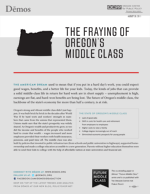The American Dream used to mean that if you put in a hard day's work, you could expect good wages, benefits, and a better life for your kids. Today, the kinds of jobs that can provide a solid middle-class life in return for hard work are in short supply - unemployment is high, earnings are flat, and hard-won benefits are being lost. The future of Oregon's middle class, the backbone of the state's economy for more than half a century, is at risk.
Oregon's strong and vibrant middle class didn't just happen. It was built brick by brick in the decades after World War II by hard work and workers' strength in numbers that came from the unions that represented them. Unions made sure that the state's prosperity was widely shared. As Oregon's wealth and productivity grew, so too did the income and benefits of the people who worked hard to create that wealth - wages increased and more employers provided their workers with health insurance, pensions, and paid time off. The middle class was also built by policies that invested in public infrastructure (from schools and public universities to highways), supported homeownership and made a college education accessible to a new generation. Parents without higher education themselves were able to send their kids to college with the help of affordable tuition at state universities and financial aid.
The fraying of the social contract may have predated the Great Recession, but the economic crisis has substantially increased the pressure on Oregon's middle class. As the state recovers from the economic crisis, now is the time for workers, employers, and policymakers to come together once again to rebuild pathways to the middle class, create good jobs with fair pay and decent benefits, and ensure that prosperity is broadly shared for the next generation.
